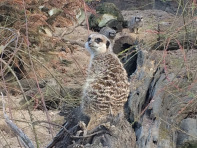ZOOS: PRISONS OR AGENCIES OF PROTECTION?
- 31 mars 2017
- 3 min de lecture

In a middle of the night, in Thoiry Zoo (France), the 7 March of 2017, two poachers entered into the rhinoceros pen and killed Vince, a five years old rhinoceros to steal his horn for probably sell it on the black market. The protection of rhinoceros in their background around the world became a big deal. However, it’s the first time that an event like that happens in an Occidental zoo. This event asks the question of the security of animal in Zoos and more generally of the interest of Zoos in animal protection. Indeed, if animals are as the danger in Zoos as they are in wild what the interest of keeping them in zoos is?

First, we have to think about how animals are considered in our society to understand why zoos were created. Philosophers thought a lot to animals spirit and conscience. In a lot of traditions, particularly in Asia, we consider animal as a reincarnation of humans. Vitalism movement considers that the living was special and could never be associated with an object, the idea of reincarnation was also a big topic for philosophers. Indeed, if we look at animals as one of our ancestors, how can we consider to eat them or to mistreated them? However, the philosopher and writer Elisabeth De Fontenay explained for Arte in 2014: “Philosophers like Descartes wanted to stop the belief in an animal soul, and he builds the “machine animal“ belief. This belief had a horrible impact on our relationship with animals.“ This statement explains in a certain way the creation of zoos, where animal became an attraction.

2. ZOOS EVOLUTION
Zoos changed a lot since 1752 and the creation of the first zoo in Vienna. Indeed, pens are bigger, and zoos have a real interest in animal wellbeing. However, Vienna zoo was so catastrophic that even few modifications were already a big thing. Tourists rooms were larger than the runs. Nowadays, Zoos offer activities to avoid boredom and runs which look like as possible as animal’s natural environment. The mains objectives of 21rst centuries zoos are entertainment, education, protection, and research.

However, there is still progress to do. Indeed, if nowadays, western zoos created the quite good living conditions for animals, it’s not the case at all in Asia (Daily Mail article), where some zoo are even worst than Vienna Zoo in 1752. Moreover, “good conditions of living“ in western zoos is still relative. Indeed, scientist proved that zoo animals have stress and madness behaviors. Indeed, a polar bear could never have a similar climate in a zoo in Europe and will suffer from this. Finally, whatever what zoo changed, animals are still considerate as a consumption product. Families pay as due to see lions, elephants, etc. Is it ethics?


3. EDUCATION

Nowadays, zoos are playing an education role, by highlight the species in danger of extinction, especially with information poster that we can find all around the zoos. The purpose of this is to inform the public about the causes of the disappearance of species and sometimes what they can do to change this.
The purpose is noble. However, most of the animals presented in zoos are not on the red list. Indeed, the animals on this red list are mainly invertebrates, birds, and reptiles but in zoos, most of the animals are mammals because it’s what the public expect to see.
4. PROTECTION PROGRAMS & RE-INTRODUCTION

To complete the education programs zoos are making protection and re-introduction programs. For example thanks to this kind of programs, there are 400 pandas born in zoos while so few are living in nature. The panda program is a success. In zoos, we can also find 50 species that disappeared in nature. Zoos is a kind of animal conservatory.
However, these animals born in zoos became subspecies of their wild brothers. Their behaviors changed to adapt to humans, and their gene changed mainly because of consanguinity. Even if programs are made to control consanguinity, a lot of species would need new genes. Finally, on the 400 pandas born in zoos, only five were released, and two of them died because they could not adapt to wildlife.
5. IN SITU CONSERVATION




















Commentaires